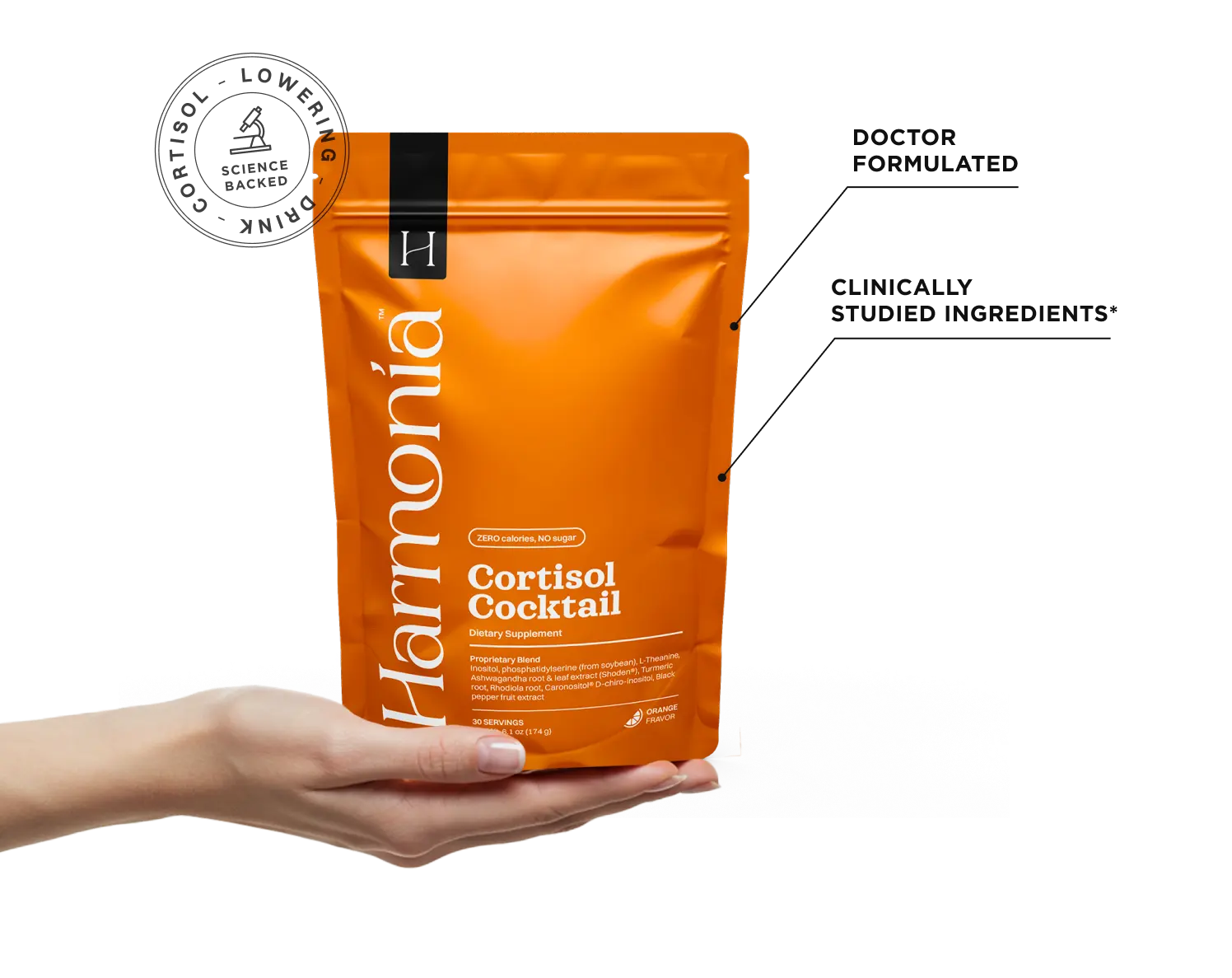Perimenopause is a natural but often challenging transition in a woman’s life. As estrogen and progesterone begin to fluctuate, another hormone quietly influences how this phase feels: cortisol, the body’s main stress hormone.
Many women in perimenopause report fatigue, insomnia, mood swings, and stubborn weight gain - all symptoms that may be linked to cortisol imbalance.
This guide will explore what cortisol is, what perimenopause means for your body, and how the two are connected. Most importantly, it will share practical ways to manage cortisol during perimenopause so you can move through this transition with more balance and resilience.
What Is Cortisol?
Cortisol is often called the “stress hormone,” but its role goes far beyond handling tough days. Produced by the adrenal glands, cortisol helps regulate:
- Metabolism and energy use
- Blood sugar balance
- Inflammation response
- Sleep-wake cycles
- Memory and focus
Under normal circumstances, cortisol follows a natural rhythm: levels rise in the morning to help you wake up and gradually decline throughout the day, reaching their lowest point at night to prepare for rest.
When cortisol levels become chronically high - often due to stress, poor sleep, or hormonal changes - it can disrupt nearly every system in the body. Symptoms may include anxiety, weight gain, digestive issues, and even cardiovascular problems. On the other hand, cortisol levels that are too low may cause fatigue, dizziness, and difficulty handling stress.
What Is Perimenopause?

Perimenopause is the transitional stage before menopause, typically beginning in a woman’s 40s but sometimes earlier. This phase can last anywhere from a few years to a decade. It officially ends once a woman has gone 12 months without a menstrual cycle.
During perimenopause, estrogen and progesterone fluctuate unpredictably. These hormonal shifts lead to many of the well-known symptoms:
- Irregular periods
- Hot flashes and night sweats
- Mood swings and irritability
- Sleep disturbances
- Brain fog and memory lapses
- Weight changes and slowed metabolism
Because cortisol and reproductive hormones are interconnected, perimenopause often makes women more vulnerable to stress. This means that cortisol balance becomes even more important during this stage of life.
Symptoms of Cortisol Dysregulation in Perimenopause
Many common perimenopause symptoms overlap with those caused by cortisol imbalance. This makes it difficult to separate which hormone is responsible - but in reality, they often work together.
- Fatigue and adrenal fatigue perimenopause: When cortisol is either too high or depleted, women may feel constant exhaustion even after adequate rest.
- Insomnia and cortisol spike at night menopause: Instead of declining at bedtime, cortisol may rise, leading to restlessness, racing thoughts, or frequent waking.
- Weight gain and sugar cravings: Cortisol influences appetite and blood sugar, often driving cravings for comfort foods.
- Mood swings, anxiety, and perimenopause stress: Elevated cortisol is strongly linked to irritability, low mood, and feelings of being overwhelmed.
- Hot flashes: Some studies suggest that high cortisol levels may worsen hot flashes or make them feel more intense.
Recognizing these patterns can help women address not just the surface symptoms, but the hormonal drivers behind them.
Stress and Perimenopause: A Double Burden
Stress alone can raise cortisol. But when stress is combined with perimenopause, the effects multiply. This is partly because lower estrogen reduces the body’s ability to regulate cortisol effectively.
Women in perimenopause may notice that situations that once felt manageable now feel overwhelming. This is why terms like perimenopause stress and adrenal fatigue perimenopause have become common. The adrenal glands are forced to pick up some of the workload left by the declining ovaries, which can lead to burnout if cortisol remains unbalanced.
Managing stress becomes not just a lifestyle choice, but a necessity for hormonal health during this stage.
Nighttime Cortisol Spikes and Sleep Problems

One of the most disruptive issues in perimenopause is poor sleep. Normally, cortisol drops at night to allow for rest. But for many women, cortisol spikes at night during menopause or perimenopause, leaving them restless, anxious, or waking up multiple times.
This broken sleep leads to more fatigue the next day, which in turn raises cortisol further - a vicious cycle. Poor sleep also contributes to brain fog, irritability, and weight gain, making cortisol regulation a priority for better rest.
Can High Cortisol Cause Hot Flashes?
Hot flashes are one of the hallmark symptoms of perimenopause. While estrogen fluctuations are the main trigger, research suggests that stress and cortisol may intensify them.
When cortisol rises, it can interfere with the body’s temperature regulation. This means women under chronic stress often experience more frequent or severe hot flashes and night sweats.
While not the only factor, high cortisol may be a hidden contributor to uncomfortable vasomotor symptoms.
Long-Term Effects of High Cortisol in Perimenopause and Menopause
While immediate symptoms are frustrating, the long-term risks of high cortisol during midlife are even more concerning.
- Bone health: Elevated cortisol may accelerate bone loss, raising the risk of osteoporosis.
- Heart health: High cortisol is linked with high blood pressure, cholesterol issues, and increased cardiovascular risk.
- Metabolic health: Cortisol imbalance can drive insulin resistance, making weight harder to control and increasing diabetes risk.
- Immune system: Chronic stress weakens immunity and increases inflammation.
- Cognitive function: High cortisol is associated with brain fog, memory issues, and mood disorders.
Addressing cortisol during perimenopause isn’t just about comfort - it’s about protecting long-term wellness.
How to Lower Cortisol During Perimenopause Naturally
Balancing cortisol during perimenopause requires a proactive, whole-body approach. Small, consistent steps can bring meaningful improvements in energy, sleep, and emotional stability.
1. Prioritize Quality Sleep
Sleep is one of the most powerful tools for regulating cortisol. Create a consistent bedtime routine, dim lights in the evening, and avoid stimulants like caffeine late in the day. A cool, dark bedroom supports melatonin production, which naturally helps cortisol decline at night.
2. Practice Stress-Relieving Techniques
Chronic stress is one of the strongest drivers of cortisol imbalance. Gentle but consistent practices - such as meditation, breathwork, or mindfulness - can lower stress and retrain the body’s response. Even 10 minutes daily can make a difference in perimenopause stress management.
3. Move Your Body Wisely

Exercise helps reduce cortisol, but balance is key. Low to moderate-intensity activity such as walking, yoga, swimming, or pilates can lower stress without spiking cortisol. Avoid excessive high-intensity workouts, which may cause cortisol spikes at night menopause.
4. Eat for Blood Sugar Balance
Unstable blood sugar can lead to cortisol surges. Prioritize protein with each meal, include healthy fats, and minimize processed sugar. Anti-inflammatory foods such as leafy greens, berries, and omega-3 rich fish support both cortisol regulation and perimenopausal health.
5. Limit Stimulants and Alcohol
Caffeine and alcohol can disrupt cortisol rhythms and worsen hot flashes, anxiety, or sleep issues. Reducing intake, especially in the afternoon and evening, helps maintain steady cortisol levels.
6. Use Adaptogens and Natural Support
Certain herbs and nutrients have been shown to support healthy cortisol function:
- Ashwagandha reduces stress and supports a more balanced mood.
- Rhodiola Rosea enhances resilience against fatigue and emotional strain.
- Holy basil and maca root may help balance both cortisol and reproductive hormones.
- Magnesium and B-vitamins support nervous system relaxation and energy metabolism.
Simplify it: Many of these adaptogens and nutrients are combined in the Harmonia Cortisol Cocktail, making it a convenient daily option for supporting stress resilience, hormonal balance, and overall well-being.
7. Build Daily Routines for Calm
Consistency tells the body it’s safe. Morning sunlight, regular mealtimes, and a calming nighttime ritual all reinforce a steady cortisol pattern. Over time, these habits retrain the body to release cortisol in a healthier rhythm.
By layering these natural approaches, women can actively lower cortisol, ease perimenopause and cortisol symptoms, and protect themselves from the long-term risks of hormone imbalance.
Smart Cortisol Support with Harmonia

Lifestyle changes go a long way in balancing cortisol, but sometimes your body needs extra help - especially during perimenopause, when stress, sleep issues, and hormonal fluctuations all collide. That’s where Harmonia comes in.
Harmonia is a smart, science-backed drink designed to support healthy cortisol levels and ease the challenges of perimenopause. It combines adaptogens, vitamins, and minerals into a refreshing, daily blend that works with your body - not against it.
How Harmonia Helps
- Supports calmer moods: Ingredients like L-Theanine and Ashwagandha help ease stress, reduce irritability, and promote a sense of balance.
- Improves sleep quality: By helping cortisol follow its natural rhythm, Harmonia makes it easier to fall asleep and wake up refreshed.
- Stabilizes energy and cravings: Myo-Inositol and D-Chiro Inositol support blood sugar balance, reducing energy crashes and emotional eating.
- Boosts resilience: Rhodiola Rosea helps the body adapt to daily stressors, preventing burnout and fatigue.
- Promotes whole-body health: Anti-inflammatory botanicals like Turmeric plus essential vitamins and minerals support immune function, metabolism, and brain health.
Why It Matters in Perimenopause
During perimenopause, the body’s ability to manage cortisol naturally declines. Harmonia fills in those gaps, helping you handle stress more smoothly, sleep more deeply, and feel more like yourself again. It’s a simple, enjoyable way to bring balance back to both your cortisol and your daily life.
References
- Greendale, G. A., Derby, C. A., & Maki, P. M. (2011). Perimenopause and cognition. Obstetrics and gynecology clinics of North America, 38(3), 519. Link.
- Prior, J. C., & Hitchcock, C. L. (2011). The endocrinology of perimenopause: need for a paradigm shift. Front Biosci (Schol Ed), 3(2), 474-486. Link.







